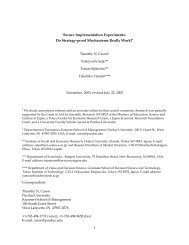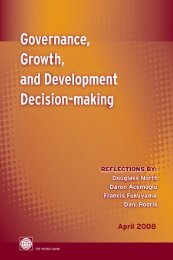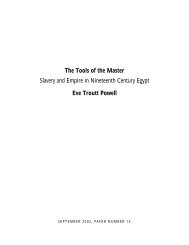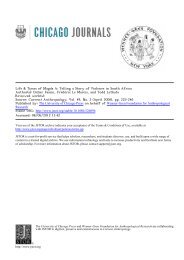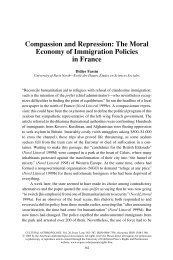Peter H. Huang Harold E. Kohn Chair Professor of Law James ...
Peter H. Huang Harold E. Kohn Chair Professor of Law James ...
Peter H. Huang Harold E. Kohn Chair Professor of Law James ...
You also want an ePaper? Increase the reach of your titles
YUMPU automatically turns print PDFs into web optimized ePapers that Google loves.
Emotional Impact Analysis<br />
have long adopted CVS methodology in assessing environmental, health, and safety regulations, despite<br />
its many problems, such as its hypothetical nature. 254<br />
Fortunately and more recently, a number <strong>of</strong> economists have begun to employ other survey<br />
methodologies besides CVS. 255 Applications include researching behavioral macroeconomics (that<br />
incorporates realistic behavioral assumptions grounded in psychological and sociological observations); 256<br />
conducting field research in development economics; 257 analyzing the observed relationship between<br />
income and subjective well-being; 258 analyzing the switch to business majors and careers during the<br />
1970s and 1980s; 259 explaining adjustments in the use <strong>of</strong> contraceptives to limit family size; 260 and<br />
understanding why similar households end up with very different wealth levels. 261<br />
Self-reported measures are ubiquitous in research about happiness and subjective well-being<br />
(SWB); 262 although there remain concerns about exactly what such reports mean and measure. 263<br />
Psychological evidence in experimental settings and from reported happiness surveys finds that people<br />
254 See e.g., <strong>James</strong> J. Murphy & Thomas H. Stevens, Contingent Valuation, Hypothetical Bias, and Experimental<br />
Economics, 33 AGRIC. & RESOURCE ECON. REV. 182 (2004).<br />
255 See e.g., Truman Bewley, Interviews as a Valid Empirical Tool in Economics, 31 J. SOCIO-ECON. 343, 344-52<br />
(2002) (describing data analysis, interviewing, and sampling methods for conducting survey research); and BEWLEY,<br />
supra note 253, at 20-37 (1983) (detailing interview methodology).<br />
256 See generally George A. Akerl<strong>of</strong>, Behavioral Macroeconomics and Macroeconomic Behavior, 92 AM. ECON.<br />
REV. 411 (2002); BEWLEY, supra note 253.<br />
257 GRAHAM & PETTINATO, supra note 249; Robert Townsend, Financial Systems in Northern Thai Villages, 110 Q.<br />
J. ECON. 1011 (1995); Christopher Udry, Risk and Insurance in a Rural Credit Market: An Empirical Investigation<br />
in Northern Nigeria, 61 REV. ECON. STUD. 495 (1994); and Christopher Udry, Risk and Saving in Northern Nigeria,<br />
85 AM. ECON. REV. 1287 (1995).<br />
258 RICHARD A. EASTERLIN, Economics and the Use <strong>of</strong> Subjective Testimony, in THE RELUCTANT ECONOMIST :<br />
PERSPECTIVES ON ECONOMICS, ECONOMIC HISTORY, AND DEMOGRAPHY 22-24 (2004).<br />
259 Id., at 24-26.<br />
260 Id., at 26-28.<br />
261 John Ameriks, Andrew Caplin, & John Leahy, Wealth Accumulation and the Propensity to Plan, 118 Q. J. ECON.<br />
1007 (2003) (providing new and unique survey data <strong>of</strong> differences in the attitudes and skills that households possess<br />
when they approach financial planning).<br />
262 See generally Ed Diener, Subjective Well-Being: The Science <strong>of</strong> Happiness and a Proposal for a National Index,<br />
55 AM. PSYCHOL. 34 (2000); Daniel Kahneman et al., Toward National Well-Being Accounts, 94 AM. ECON. REV.<br />
429 (2003); Daniel Kahneman & Alan B. Krueger, Developments in the Measurement <strong>of</strong> Subjective Well-Being, J.<br />
ECON. PERSP ., Winter 2006, at 3; and Kahneman et al., supra note 250. See generally Bruno S. Frey & Alois<br />
Stutzer, What Can Economists Learn from Happiness Research?, 40 J. ECON. LITERATURE 402 (2002).<br />
263 See e.g., Thomas D. Griffith, Progressive Taxation and Happiness, 45 B.C. L. REV. 1363, 1368-70 (2004)<br />
(discussing several possible types <strong>of</strong> errors in self-reported happiness); Daniel Hamermesh, Subjective Outcomes in<br />
Economics, 71 SOUTHERN ECON. J. 2, 3-4 (2004) (examining critically work that economists have done about selfreported<br />
life satisfaction); and Diane M. Ring, Why Happiness?: A Commentary on Griffith's Progressive Taxation<br />
42



